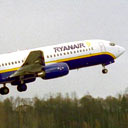
The Liberal Democrats said today that they would add £10 to the price of domestic flights in a bid to halt global warming.
Announcing the party's transport plan, Chris Huhne, the party's environment spokesman, and Susan Kramer, its transport spokeswoman, proposed £10-a-ticket taxes on UK domestic flights and new lorry tolls to pay for investment in the UK's railways.
The party estimates that these taxes could yield some £750m annually, or £12bn over five years if invested on the markets.
"These plans will shift freight from road to rail, cut carbon, and improve mobility as the rail network begins to run out of capacity," Mr Huhne said, putting the figure of UK carbon emissions that would be cut at 2.6m tonnes a year.
The Liberal Democrats - buoyant after a healthy performance in Ealing Southall byelection - have put "green tax" proposals at the heart of a series of policy announcements this summer.
In early July they announced that money raised from aviation tax should they come to power would go towards reducing tax for people on lower incomes.
These policy announcements - which will now be debated at the party's annual conference in the autumn - have largely been overshadowed by Gordon Brown's policy blitz during his first month in office, and internal division within the Conservative party following the rows over grammar schools and David Cameron's trip to Rwanda.
All the parties have engaged in some "green-washing" of their policies over the last year, but the Liberal Democrats have embraced green taxes most wholeheartedly.
Though Gordon Brown did unfreeze the fuel duty escalator in this year's budget - frozen since the fuel protests in 2000 - he is thought to favour tackling environmental change through European regulation rather than changing the UK tax regime.
The Labour government has actually reduced the number of green taxes since it came to power.
The Conservatives have hinted that they might adopt a programme of green taxes but their exact position is unclear pending the publication of two policy group reports: those of John Redwood's Economic Competitiveness task force, due in the middle of August, and Zac Goldsmith's Quality of Life group, due in early September.
It has been suggested that a Conservative commitment to green taxes might help the Tories fund tax cuts elsewhere - which the right wing of their party would like to see - while burnishing their green credentials.
The Liberal Democrats' new transport strategy also backed investment in north-south and east-west high-speed rail links, connecting London with Birmingham, Leeds, Manchester, Tyneside and Scotland in the north and Bristol, Cardiff and Exeter in the west.
The party said that such investment in France and Germany had "killed" internal short-haul flights, and Mr Huhne pointed to the 19% jump in passengers on Channel tunnel trains linking London to Paris and Brussels after journey times were reduced as backing up the party's argument.
A lorry toll similar to systems already in place in Germany, Austria, Switzerland and the Czech Republic could produce £600m a year, said the Lib Dems.
Truckers would pay an average of 11p a mile, with the charge varying according to vehicle emissions.
The German tolling system requires lorry drivers to declare journeys in special lay-bys or to install a £50 transponder in the cab which automatically tracks their movements.
Private motorists avoided punitive measures such as road taxes in the plans, since the Liberal Democrats thought that the effects of any road-pricing schemes would not be felt within the 10 years needed to halt global warming.
As well as that, a new "Future Transport Fund" would be expected to support initiatives like fare reductions for passengers; action to remove bottlenecks in the system at locations such as Reading and Swindon; relief schemes like London's Crossrail; increased train lengths; electrification of lines; and the reopening of some closed lines, such as the Oxford-Cambridge link.

